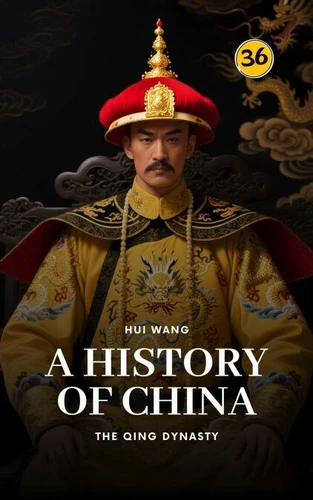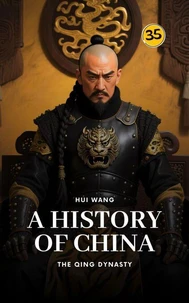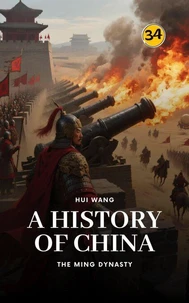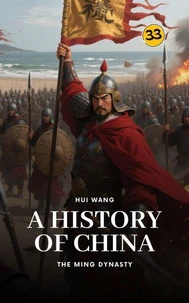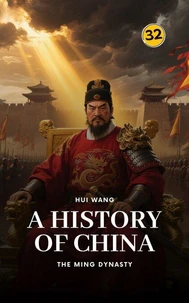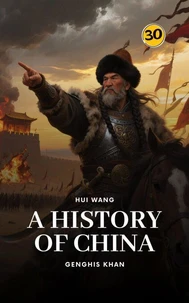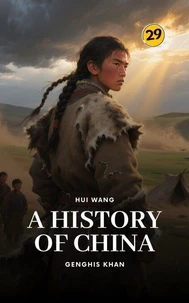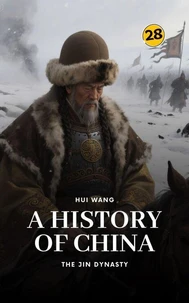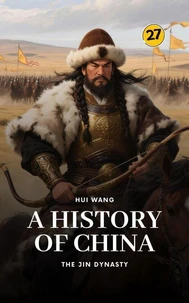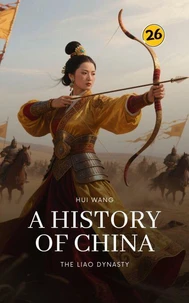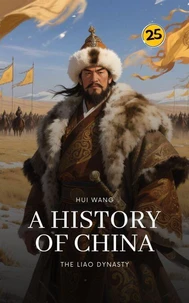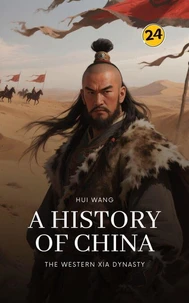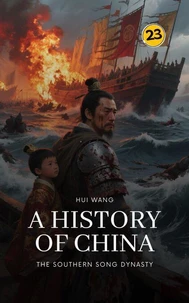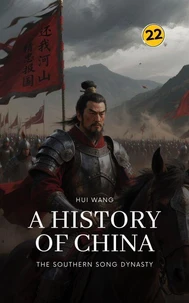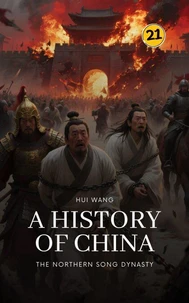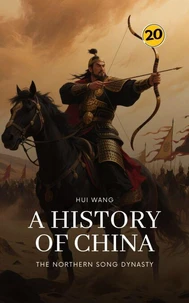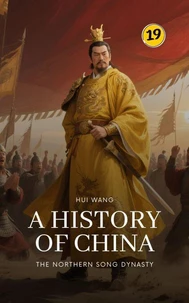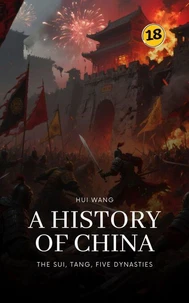Nouveauté
The Qing Dynasty: A History of China. A History of China, #36
Par :Formats :
Disponible dans votre compte client Decitre ou Furet du Nord dès validation de votre commande. Le format ePub est :
- Compatible avec une lecture sur My Vivlio (smartphone, tablette, ordinateur)
- Compatible avec une lecture sur liseuses Vivlio
- Pour les liseuses autres que Vivlio, vous devez utiliser le logiciel Adobe Digital Edition. Non compatible avec la lecture sur les liseuses Kindle, Remarkable et Sony
 , qui est-ce ?
, qui est-ce ?Notre partenaire de plateforme de lecture numérique où vous retrouverez l'ensemble de vos ebooks gratuitement
Pour en savoir plus sur nos ebooks, consultez notre aide en ligne ici
- FormatePub
- ISBN978-91-90115-49-7
- EAN9789190115497
- Date de parution04/10/2025
- Protection num.pas de protection
- Infos supplémentairesepub
- ÉditeurHui Wang
Résumé
The Qing Dynasty: A History of China, PART TWO, takes you deep into the lives of emperors and ministers whose choices changed the course of China. From Emperor Kangxi, who reigned longer than any other in Chinese history, to his son Emperor Yongzheng, famous for his tireless work ethic, and finally to the celebrated Emperor Qianlong, this book explores the dynasty's most powerful rulers. Each chapter brings their struggles, ambitions, and personal battles into focus, showing how the throne was never guaranteed, even within the imperial family.
One of the most dramatic stories is the "War for Power" among Kangxi's many sons. Princes like Yinsi, Yintang, Yinti, and Yinzhen - who would become Emperor Yongzheng - all risked everything in a fierce contest for succession. The betrayals, alliances, and heartbreak in this struggle reveal the raw human side of history, where even blood brothers could become deadly rivals. Beyond the emperors, you will meet generals and officials whose names still echo through Chinese history.
Nian Gengyao, the brilliant but arrogant commander of the northwest, rose to incredible heights before his fall. Longkodo, the powerful uncle of Yongzheng, stood at the center of Beijing's military power. And ministers like Yinxiang, Suoertu, and Mingzhu each left their mark on the empire through loyalty, ambition, or rivalry. Their stories show the constant danger of serving close to the throne. This book also shines a light on unexpected figures who changed the dynasty's course.
From the governor who only found his calling late in life, to the illiterate man who still held office, to the only Han official ever honored in the Imperial Temple - their lives prove that influence came in many forms. Even powerful women, like those who stood behind emperors and princes, shaped the destiny of the dynasty in ways often overlooked. From the founding of the Grand Council to wars in Tibet, Jinchuan, and Southeast Asia, to struggles with vassal kings in Annam, these chapters reveal how politics, war, and family shaped an empire that lasted nearly three centuries.
One of the most dramatic stories is the "War for Power" among Kangxi's many sons. Princes like Yinsi, Yintang, Yinti, and Yinzhen - who would become Emperor Yongzheng - all risked everything in a fierce contest for succession. The betrayals, alliances, and heartbreak in this struggle reveal the raw human side of history, where even blood brothers could become deadly rivals. Beyond the emperors, you will meet generals and officials whose names still echo through Chinese history.
Nian Gengyao, the brilliant but arrogant commander of the northwest, rose to incredible heights before his fall. Longkodo, the powerful uncle of Yongzheng, stood at the center of Beijing's military power. And ministers like Yinxiang, Suoertu, and Mingzhu each left their mark on the empire through loyalty, ambition, or rivalry. Their stories show the constant danger of serving close to the throne. This book also shines a light on unexpected figures who changed the dynasty's course.
From the governor who only found his calling late in life, to the illiterate man who still held office, to the only Han official ever honored in the Imperial Temple - their lives prove that influence came in many forms. Even powerful women, like those who stood behind emperors and princes, shaped the destiny of the dynasty in ways often overlooked. From the founding of the Grand Council to wars in Tibet, Jinchuan, and Southeast Asia, to struggles with vassal kings in Annam, these chapters reveal how politics, war, and family shaped an empire that lasted nearly three centuries.
The Qing Dynasty: A History of China, PART TWO, takes you deep into the lives of emperors and ministers whose choices changed the course of China. From Emperor Kangxi, who reigned longer than any other in Chinese history, to his son Emperor Yongzheng, famous for his tireless work ethic, and finally to the celebrated Emperor Qianlong, this book explores the dynasty's most powerful rulers. Each chapter brings their struggles, ambitions, and personal battles into focus, showing how the throne was never guaranteed, even within the imperial family.
One of the most dramatic stories is the "War for Power" among Kangxi's many sons. Princes like Yinsi, Yintang, Yinti, and Yinzhen - who would become Emperor Yongzheng - all risked everything in a fierce contest for succession. The betrayals, alliances, and heartbreak in this struggle reveal the raw human side of history, where even blood brothers could become deadly rivals. Beyond the emperors, you will meet generals and officials whose names still echo through Chinese history.
Nian Gengyao, the brilliant but arrogant commander of the northwest, rose to incredible heights before his fall. Longkodo, the powerful uncle of Yongzheng, stood at the center of Beijing's military power. And ministers like Yinxiang, Suoertu, and Mingzhu each left their mark on the empire through loyalty, ambition, or rivalry. Their stories show the constant danger of serving close to the throne. This book also shines a light on unexpected figures who changed the dynasty's course.
From the governor who only found his calling late in life, to the illiterate man who still held office, to the only Han official ever honored in the Imperial Temple - their lives prove that influence came in many forms. Even powerful women, like those who stood behind emperors and princes, shaped the destiny of the dynasty in ways often overlooked. From the founding of the Grand Council to wars in Tibet, Jinchuan, and Southeast Asia, to struggles with vassal kings in Annam, these chapters reveal how politics, war, and family shaped an empire that lasted nearly three centuries.
One of the most dramatic stories is the "War for Power" among Kangxi's many sons. Princes like Yinsi, Yintang, Yinti, and Yinzhen - who would become Emperor Yongzheng - all risked everything in a fierce contest for succession. The betrayals, alliances, and heartbreak in this struggle reveal the raw human side of history, where even blood brothers could become deadly rivals. Beyond the emperors, you will meet generals and officials whose names still echo through Chinese history.
Nian Gengyao, the brilliant but arrogant commander of the northwest, rose to incredible heights before his fall. Longkodo, the powerful uncle of Yongzheng, stood at the center of Beijing's military power. And ministers like Yinxiang, Suoertu, and Mingzhu each left their mark on the empire through loyalty, ambition, or rivalry. Their stories show the constant danger of serving close to the throne. This book also shines a light on unexpected figures who changed the dynasty's course.
From the governor who only found his calling late in life, to the illiterate man who still held office, to the only Han official ever honored in the Imperial Temple - their lives prove that influence came in many forms. Even powerful women, like those who stood behind emperors and princes, shaped the destiny of the dynasty in ways often overlooked. From the founding of the Grand Council to wars in Tibet, Jinchuan, and Southeast Asia, to struggles with vassal kings in Annam, these chapters reveal how politics, war, and family shaped an empire that lasted nearly three centuries.

